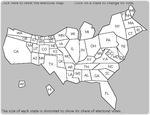One of the things that really bugs me about our current governmental system is the Electoral College. When I was growing up, democracy (and, thus, the U.S. Government) was always explained to me as one vote per citizen, majority rule. This makes sense to me.
What I’ve never understood is the Electoral College (and, therefore, I may have the following summary somewhat incorrect — please correct me if so). Rather than tallying the votes cast by the American public in a presidential election, the EC votes are used to elect the President. The number of possible EC votes is finite, determined by assigning a certain number of EC votes to each state, based roughly on its population. Furthermore, when it comes to actually casting the votes, each state puts all of its votes behind one candidate, depending on what the majority of voters in that state voted for.
For instance, Alaska has a population of roughly 500,000, and gets three electoral votes. If just over half of Alaska’s voting population votes Republican, then as far as the Electoral College is concerned, all of Alaska votes Republican, as all three EC ballots are cast for the Republican candidate.
To the right you can see a map of the United States, with each state distorted as to how many EC votes it gets. (The graphic was taken from an excellent interactive electoral map that allows you to click on each state, seeing how many EC votes it gets and switching them from Democrat to Republican to play with election possibilities.)
I have never understood why the Electoral College system was considered a good idea when it was implemented, nor why it continues to be used. The Bush/Gore upset of 2000, when Gore won the popular vote but Bush took the Electoral College (and therefore the presidency), just made it more clear to me that this is a highly imperfect system for a “democracy” to use as its voting system. My grumbling isn’t going to get the system changed, but I’d sure like to see it changed — preferably to the very simple, easy to figure out, doesn’t cause problems, one voice equals one vote.

